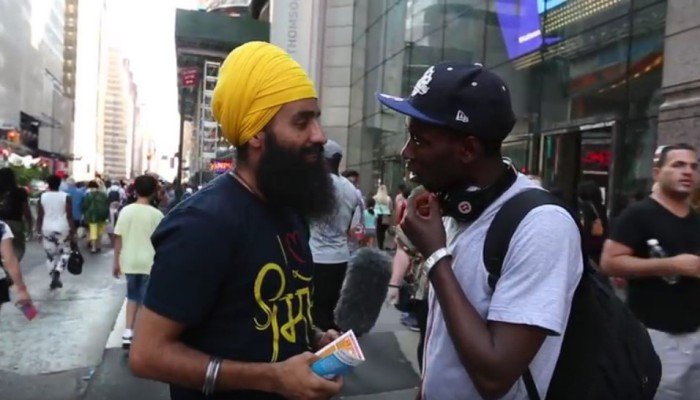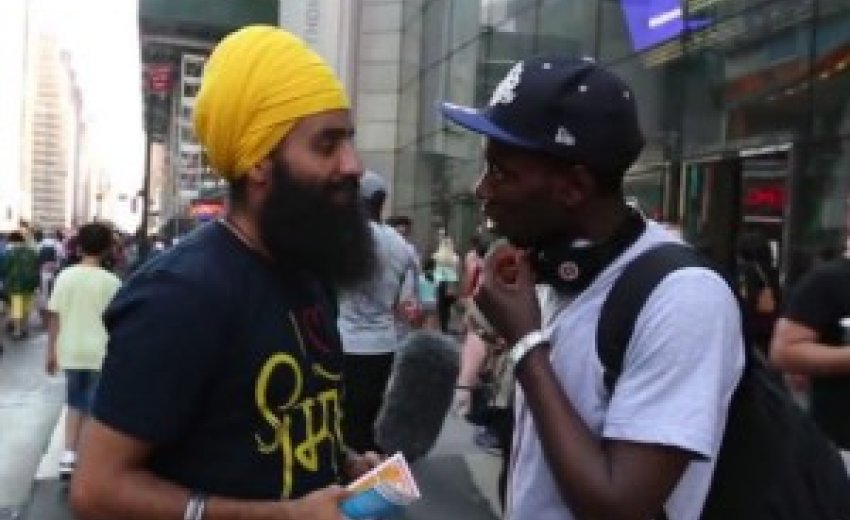‘They Call Me Osama’ Filmmaker Maneetpaul Singh on Challenging Sikh Stereotypes
His debut project explores the diverse experiences of Sikhs in America including misconceptions about the religion that seem to prevail post-9/11.

July 6, 2016: “Who is a Sikh?”
“Is this a Hindu, or what is it?”
“Why do you grow your hair?”
Those were some of the questions fielded by British YouTuber Jagraj Singh as he stood in a crowded Times Square, inviting strangers to talk to him about Sikhism. Singh’s impromptu interviews serve as the opening scene of the new documentary “They Called Me Osama.”
Many of the people Singh encountered had little to no knowledge of Sikhism, the world’s fifth largest religion. Filmmaker Maneetpaul Singh, who created the short documentary, is hoping to change that. His debut project explores the diverse experiences of Sikhs in America including misconceptions about the religion that seem to prevail post-9/11. The film features first-hand accounts from victims of hate crimes and cyber-bullying. It also aims to educate those unfamiliar with the Sikh religion.
“Many people don’t know why we look the way we look, or the simple fact that we are an independent religion,” Singh said. “I wanted to make a film that would help bring awareness to this.”
The project was about a year in the making. Singh made his vision come to life with the help of funding from the University of Connecticut’s IDEA grant program. One of the first concepts he came up with was the film’s provocative title. Singh knew he wanted to go with something that would get noticed.
“More importantly, I wanted something that non-Sikh audiences would feel inclined to click on to learn more,” he said. “The title clearly implies the fact that Sikhs are victims of mistaken identity, most often in relation to terrorism.”
Each perspective included in the film is purposeful. Singh wanted to showcase the range of hate crimes that the Sikh community faces. The audience hears from Japjee Singh, a student who described being taunted for his appearance and eventually brutally assaulted by a classmate.
“Japjee’s story showcases how this issue is not just isolated to adults, but also to the new and upcoming generations,” Maneetpaul Singh said.
The documentary also features a one-on-one interview with Balpreet Kaur, a Sikh woman who gained global notoriety after being cyber-bullied in a Reddit post mocking her facial hair. Kaur’s eloquent response to the taunting went viral, with the author of the original post publically apologizing to her.
“People normally associate hate crimes with violence, but there are far more categories than this,” Singh said. “Balpreet Kaur’s story really shined a light to how hate crimes have evolved in a digital world.”
Why is it that so many Sikh Americans have been singled out as the targets of hate crimes? Singh uses the term “apparent Muslim” to describe the phenomenon where people who “look Muslim” – those with brown skin, beards and turbans – are often labeled terrorists. He hopes his documentary will help dispel those stereotypes.
“Even if someone was a Muslim, it doesn’t make them a terrorist, and it certainly doesn’t make it right to inflict a hate-crime,” Singh said. “The purpose of this film is not to shift the blame of this issue to another religion, but rather to spread the message that our society should stop judging people based off of appearances.”

